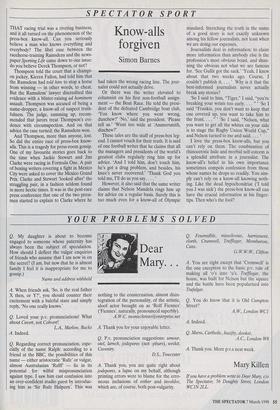SPECTATOR SPORT
Know-alls forgiven
Simon Barnes
THAT racing trial was a riveting business, and it all turned on the phenomenon of the press-box know-all. Can you seriously believe a man who knows everything and everybody? The libel case between the racehorse-training Ramsdens and the news- paper Sporting Life came down to one issue: do you believe Derek Thompson, or not?
Thompson told the court that a champi- on jockey, Kieren Fallon, had told him that the Ramsdens had told him to stop a horse from winning — in other words, to cheat. But the Ramsdens' lawyer discredited this evidence with a blister-raising ad hominem assault. Thompson was accused of being a name-dropper, a know-all of suspect truth- fulness. The judge, summing up, recom- mended that jurors treat Thompson's evi- dence with circumspection. And on that advice the case turned; the Ramsdens won.
And Thompson, more than anyone, lost. So did the entire race of press-box know- alls. This is a tragedy for press-room gossip. One of my favourite stories goes back to the time when Jackie Stewart and Jim Clarke were racing in Formula One. A pair of boxing writers covering a fight in Mexico City were asked to cover the Mexico Grand Prix. Clarke and Stewart 'looked after' the struggling pair, in a fashion seldom found in more hectic times. It was in the post-race press conference that one of the two press- men started to explain to Clarke where he had taken the wrong racing line. The jour- nalist could not actually drive.
Or there was the writer elevated to columnist on his first non-football assign- ment — the Boat Race. He told the presi- dent of the defeated Cambridge boat club, `You know where you went wrong, dunchew?"No,' said the president. 'Please tell us.' Went too wide at 'Ammersmith, dinchew?'
These tales are the stuff of press-box leg- end. I cannot vouch for their truth. It is said of one football writer that he claims that all the managers and presidents of the world's greatest clubs regularly ring him up for advice. 'And I told him, don't touch him, he's got a drug problem, and besides, his knee's never recovered.' Thank God you told me, I'll do as you say. . . '
However, it also said that the same writer claims that Nelson Mandela rings him up for advice on a regular basis. Surely this is too much even for a know-all of Olympic standard. Stretching the truth in the name of a good story is not exactly unknown among his fellow journalists, not least when we are doing our expenses.
Journalists deal in information; to claim more information than anybody else is the profession's most obvious boast, and shun- ning the obvious not what we are famous for. 'See Gullit got the sack."Yeah, I knew about that two weeks ago. Course, I couldn't publish it. . . . ' Why is it that the best-informed journalists never actually break any stories?
`So I said to him, "Tiger," I said, "you're breaking your wrists too early. . . " "So I said "Frankie, you don't want to keep that one covered up, you want to take him to the front. . " "So I said, "Nelson, what you want to get all the whites on your side is to stage the Rugby Union World Cup," and Nelson turned to me and said. . . . '
I love the press-box know-alls, but you can't rely on them. The combination of rhinocerotic hide and morbid self-esteem is a splendid attribute in a journalist. The know-all's belief in his own importance sometimes compels confession from those whose names he drops so readily. You sim- ply can't rely on a know-all knowing noth- ing. Like the dead hypochondriac (I told you I was sick') the press-box know-all can have the crucial information at his finger- tips. Then who's the fool?


























































 Previous page
Previous page